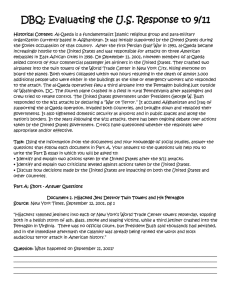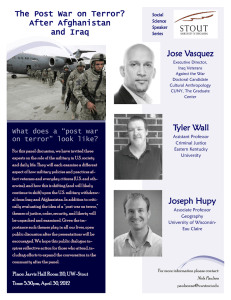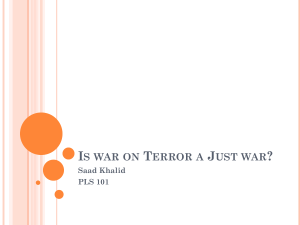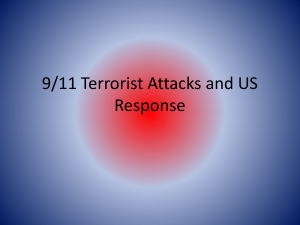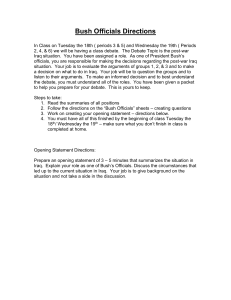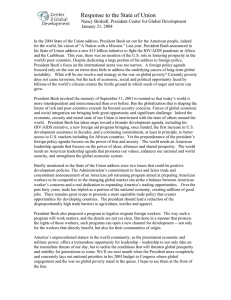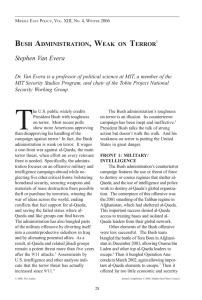DBQ: Evaluating the U.S. Response to 9/11
advertisement
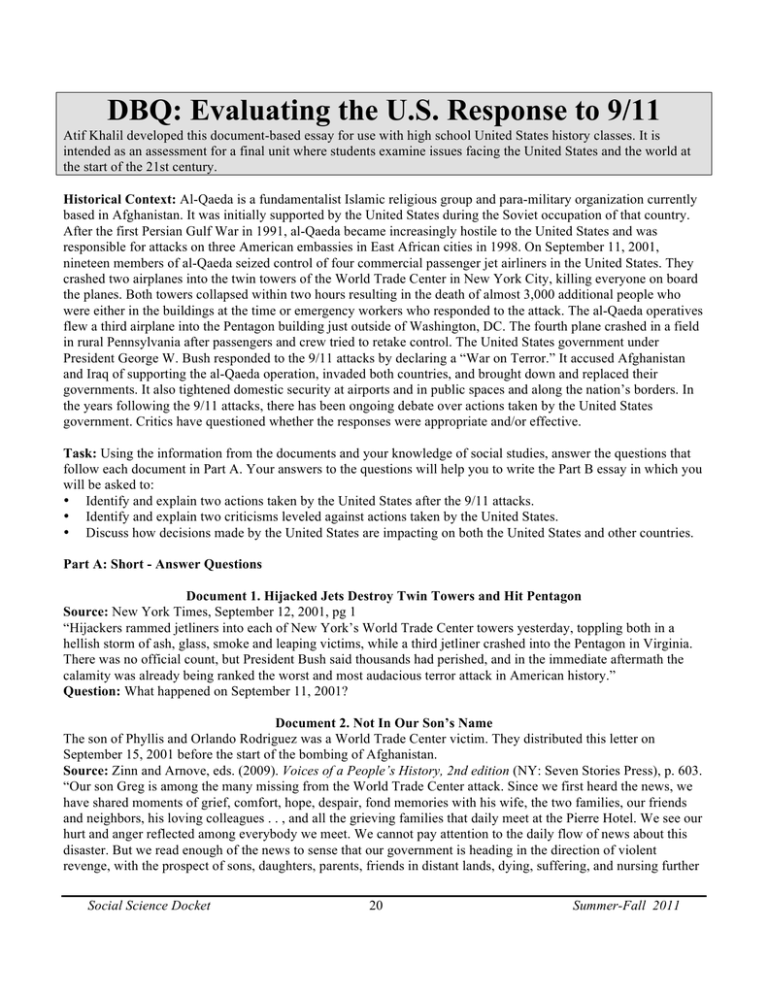
DBQ: Evaluating the U.S. Response to 9/11 Atif Khalil developed this document-based essay for use with high school United States history classes. It is intended as an assessment for a final unit where students examine issues facing the United States and the world at the start of the 21st century. Historical Context: Al-Qaeda is a fundamentalist Islamic religious group and para-military organization currently based in Afghanistan. It was initially supported by the United States during the Soviet occupation of that country. After the first Persian Gulf War in 1991, al-Qaeda became increasingly hostile to the United States and was responsible for attacks on three American embassies in East African cities in 1998. On September 11, 2001, nineteen members of al-Qaeda seized control of four commercial passenger jet airliners in the United States. They crashed two airplanes into the twin towers of the World Trade Center in New York City, killing everyone on board the planes. Both towers collapsed within two hours resulting in the death of almost 3,000 additional people who were either in the buildings at the time or emergency workers who responded to the attack. The al-Qaeda operatives flew a third airplane into the Pentagon building just outside of Washington, DC. The fourth plane crashed in a field in rural Pennsylvania after passengers and crew tried to retake control. The United States government under President George W. Bush responded to the 9/11 attacks by declaring a “War on Terror.” It accused Afghanistan and Iraq of supporting the al-Qaeda operation, invaded both countries, and brought down and replaced their governments. It also tightened domestic security at airports and in public spaces and along the nation’s borders. In the years following the 9/11 attacks, there has been ongoing debate over actions taken by the United States government. Critics have questioned whether the responses were appropriate and/or effective. Task: Using the information from the documents and your knowledge of social studies, answer the questions that follow each document in Part A. Your answers to the questions will help you to write the Part B essay in which you will be asked to: • Identify and explain two actions taken by the United States after the 9/11 attacks. • Identify and explain two criticisms leveled against actions taken by the United States. • Discuss how decisions made by the United States are impacting on both the United States and other countries. Part A: Short - Answer Questions Document 1. Hijacked Jets Destroy Twin Towers and Hit Pentagon Source: New York Times, September 12, 2001, pg 1 “Hijackers rammed jetliners into each of New York’s World Trade Center towers yesterday, toppling both in a hellish storm of ash, glass, smoke and leaping victims, while a third jetliner crashed into the Pentagon in Virginia. There was no official count, but President Bush said thousands had perished, and in the immediate aftermath the calamity was already being ranked the worst and most audacious terror attack in American history.” Question: What happened on September 11, 2001? Document 2. Not In Our Son’s Name The son of Phyllis and Orlando Rodriguez was a World Trade Center victim. They distributed this letter on September 15, 2001 before the start of the bombing of Afghanistan. Source: Zinn and Arnove, eds. (2009). Voices of a People’s History, 2nd edition (NY: Seven Stories Press), p. 603. “Our son Greg is among the many missing from the World Trade Center attack. Since we first heard the news, we have shared moments of grief, comfort, hope, despair, fond memories with his wife, the two families, our friends and neighbors, his loving colleagues . . , and all the grieving families that daily meet at the Pierre Hotel. We see our hurt and anger reflected among everybody we meet. We cannot pay attention to the daily flow of news about this disaster. But we read enough of the news to sense that our government is heading in the direction of violent revenge, with the prospect of sons, daughters, parents, friends in distant lands, dying, suffering, and nursing further Social Science Docket 20 Summer-Fall 2011 grievances against us. It is not the way to go. It will not avenge our son's death. Not in our son's name. Our son died a victim of an inhuman ideology. Our actions should not serve the same purpose. Let us grieve. Let us reflect and pray. Let us think about a rational response that brings real peace and justice to our world. But let us not as a nation add to the inhumanity of our times.” Questions 1. Who was Greg Rodriguez? 2. Why did his parents write this letter? Document 3. President Bush’s Afghanistan speech Statement on October 7, 2001 by United States President George W. Bush after the start of U.S. and British military strikes on targets in Afghanistan. Source: http://www.putlearningfirst.com/language/20rhet/bushat.html “On my orders, the United States military has begun strikes against al-Qaeda terrorist training camps and military installations of the Taliban regime in Afghanistan . . . We are supported by the collective will of the world. More than two weeks ago, I gave Taliban leaders a series of clear and specific demands: Close terrorist training camps. Hand over leaders of the al-Qaeda network, and return all foreign nationals, including American citizens unjustly detained in our country. None of these demands were met. And now, the Taliban will pay a price. By destroying camps and disrupting communications, we will make it more difficult for the terror network to train new recruits and coordinate their evil plans . . . Our military action is also designed to clear the way for sustained, comprehensive and relentless operations to drive them out and bring them to justice. At the same time, the oppressed people of Afghanistan will know the generosity of America and our allies. As we strike military targets, we will also drop food, medicine and supplies to the starving and suffering men and women and children of Afghanistan.” Questions 1. What demands did President Bush make on Taliban leaders? 2. List two reasons President Bush gave for invading Afghanistan. 3. How will the United States and its allies try to win support from the Afghan people? Document 4. “An Attack on Us All: NATO’s Response to Terrorism” Remarks by NATO Secretary General, Lord George Robertson of the United Kingdom, at the National Press Club, Washington DC, October 10, 2001 Source: http://www.nato.int/docu/speech/2001/s011010b.htm “The events of September 11 have changed the world. Like the attack on Pearl Harbor 60 years ago, they have seared deeply and unforgettably into our consciousness . . . But unlike Pearl Harbor, it was not just America that suffered. On September 11, the entire civilized word was transformed. In Paris, the headlines read, ‘We are all Americans now.’ On both sides of the Atlantic, pundits are writing epitaphs for the ‘post-Cold-War era’ and birth notices for ‘the age of terrorism.’ Horrifying as September 11 undoubtedly was, it does not in my view warrant this bleak analysis. We do those who lost their lives no service at all by adopting a victim mentality. Yes, we have suffered a great blow. But we have not lost our ability – or our will – to shape events. If this is indeed to become the ‘age of terrorism’, then we will be as much at fault as Osama Bin Laden. I say this because I have been enormously heartened by events since September 11, in NATO and beyond. And because it is already possible to identify a strategy not only to defeat Bin Laden, but to ensure that any terrorist successors remain confined to the margins of history . . . The U.S. government is setting a strong example by its measured determination. No retreat. No kneejerk quick fixes. No revenge attacks. Instead, there is a deep awareness that this is going to be a long struggle, a struggle in which patience and persistence will be key. Those who expected US unilateralism have witnessed instead a masterpiece of multilateralism – rallying the world behind a common purpose in a way only the U.S. can. This has been coalition-building at its very best.” Questions 1. According to Lord George Robertson, how are the events of 9/11 different from Pearl Harbor? 2. Why does Robertson believe a “victim Mentality” is a mistake? 3. What actions by the United States does Robertson support? Social Science Docket 21 Summer-Fall 2011 Document 5. The impact of Bush linking 9/11 and Iraq Source: The Christian Science Monitor, March 14, 2003 “A New York Times/CBS poll this week shows that 45 percent of Americans believe Mr. Hussein was ‘personally involved’ in Sept. 11, about the same figure as a month ago. Sources knowledgeable about US intelligence say there is no evidence that Hussein played a role in the Sept. 11 attacks, nor that he has been or is currently aiding Al Qaeda. Yet the White House appears to be encouraging this false impression, as it seeks to maintain American support for a possible war against Iraq and demonstrate seriousness of purpose to Hussein’s regime . . . Polling data show that right after Sept. 11, 2001, when Americans were asked open-ended questions about who was behind the attacks, only 3 percent mentioned Iraq or Hussein. But by January of this year, attitudes had been transformed. In a Knight Ridder poll, 44 percent of Americans reported that either ‘most’ or ‘some’ of the Sept. 11 hijackers were Iraqi citizens. The answer is zero.” Question: What was the impact of White House efforts to link Iraq and the events of 9/11? Document 6. Vice President Dick Cheney on Meet the Press An interview with Vice-President Dick Cheney by Tim Russert on Meet the Press on September 14, 2003. Source: http://www.msnbc.msn.com/id/3080244/ns/meet_the_press “We learned more and more that there was a relationship between Iraq and al-Qaeda that stretched back through most of the decade of the ’90s, that it involved training, . . . that al-Qaeda sent personnel to Baghdad to get trained on the systems that are involved. The Iraqis providing bomb-making expertise and advice to the al-Qaeda organization. And we’ve learned subsequent to that, since we went into Baghdad and got into the intelligence files, that these individuals probably also received financing from the Iraqi government as well as safe haven.” Question: According to Vice President Cheney, what was the connection between Iraq and the attacks on 9/11? Document 7. Anti-War Activist Protests Iraq War Cindy Sheehan is an American anti-war activist whose son was killed while serving with the U.S. military in Iraq. She attracted national and international media attention in August 2005 for an extended protest outside President Bush’s Texas Ranch. Bush's Texas ranch—a stand which drew both passionate support and angry criticism. Source: http://thinkexist.com/quotes/cindy_sheehan “I was told my son was killed in the war on terror. He was killed by George Bush’s war of terror on the world . . . President Bush says we’re safer fighting them there than over here. Why are we safer because 120,000 civilians are dead? What makes their babies less precious than ours? . . . We were told that we were attacked on 9/11 because the terrorists hate our freedoms and democracy . . . not for the real reason, because the Arab Muslims who attacked us hate our Middle-Eastern foreign policy.” Question: What is Cindy Sheehan’s reaction to the U.S. response to 9/11? Document 8. Global Media Abhors United States Response to 9-11 This article was published September 11, 2006 by the Agence France Presse. Source: http://www.commondreams.org/headlines06/0911-01.htm “Newspapers across the world have strongly criticized the U.S. response to September 11, accusing the Bush administration of bungling its ‘war on terror’ and squandering global goodwill by invading Iraq. On the fifth anniversary of Al-Qaeda’s assault on New York and Washington, editorials united Monday in condemning the attacks and expressing revulsion for the Islamic extremists who carried out the atrocity. While papers said many people were still grappling with the immensity of what happened on that day, nearly all agreed the world had since become a more dangerous and uncertain place. Much criticism, especially in the Middle East and Europe, was reserved for U.S. President George W. Bush’s decision to invade Iraq under the banner of the ‘war on terror’. The New York Times acknowledged the United States had lost the feeling of unity and purpose which gripped the nation in the aftermath of the attacks, and lamented a lost opportunity. ‘When we measure the possibilities created by 9/11 against what we have actually accomplished, it is clear that we have found one way after another to compound the tragedy,’ said the paper's editorial. Summing up the mood in the British press, the Financial Times said: ‘The way the Bush administration has trampled on the international rule of law and Geneva Conventions, Social Science Docket 22 Summer-Fall 2011 while abrogating civil liberties and expanding executive power at home, has done huge damage not only to America's reputation but, more broadly, to the attractive power of Western values.’” Question: Why do the newspapers cited in this article criticize the U.S. response to 9/11? Document 9. Obama signs Patriot Act extension without reforms Source: San Francisco Chronicle, March 1, 2010 “President Obama signed a one-year extension of three sections of the USA Patriot Act on Saturday without any new limits on the measures that many liberal groups and Democrats said were necessary to safeguard American civil liberties. The provisions allow the government, with permission from a special court, to obtain roving wiretaps over multiple communication devices, seize suspects’ records without their knowledge, and conduct surveillance of a so-called ‘lone wolf,’ or someone deemed suspicious but without any known ties to an organized terrorist group . . Experts suggest that a string of foiled terrorist plots over the past year combined with the Democrats' falling ratings amid the healthcare debate blunted any move to reform the act, which was passed in the wake of 9/11. ‘We’ve stopped 28 terrorist attacks since 9/11,’ says James Carafano, a homeland security expert at The Heritage Foundation. “The Patriot Act has been a big part of that." Questions 1. What type of actions were authorized by the USA Patriot Act? 2. According to the article, why were key parts of the act renewed? Document 10. George Bush's former aide defends waterboarding of terrorism suspects On March 12, 2010, The Guardian, a British newspaper, reported that Karl Rove, a senior adviser to former. President Bush, was proud that the country used waterboarding to elicit information from terrorism suspects. Source: http://www.guardian.co.uk/world/2010/mar/12/waterboarding-terrorism-guantanamo-karl-rove “Last year President Barack Obama banned waterboarding, stating: ‘I believe that waterboarding was torture and, whatever legal rationales were used, it was a mistake.’ However, in an interview for the BBC’s Newsnight programme, Rove stood by its use. ‘I’m proud that we used techniques that broke the will of these terrorists and gave us valuable information that allowed us to foil plots such as flying aeroplanes into Heathrow and into London, bringing down aircraft over the Pacific, flying an aeroplane into the tallest building in Los Angeles and other plots,’ he said. ‘Yes, I’m proud that we kept the world safer than it was, by the use of these techniques. They’re appropriate, they’re in conformity with our international requirements and with US law.’” Question: What is the disagreement between Barack Obama and Karl Rove? Part B Essay: Write a well-organized essay that includes an introduction, several paragraphs, and a conclusion. Use evidence from at least SIX documents in your essay. Support your response with relevant facts, examples, and details. Include additional outside information. In your essay you must: • Identify and explain two actions taken by the United States after the 9/11 attacks. • Identify and explain two criticisms leveled against actions taken by the United States. • Discuss how decisions made by the United States are impacting on both the United States and other countries. Social Science Docket 23 Summer-Fall 2011
